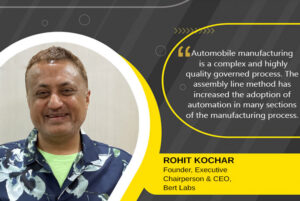 The worldwide automotive sector has weathered economic ripples stemming from the far-reaching effects of the Covid-19 pandemic and the consequential scarcity of automotive semiconductors. The sector has recovered in auto sales and is expected to grow. Automotive Industry has been one of the early adopters of technology and continues doing so. When we speak of AI in Automobile, it is mostly in reference to driverless cars, personalized vehicles, enhanced driver safety. Specifically for EV, there is a lot of work being done using AI for battery performance and user experience. It is true that AI had been at the forefront of improving the driving experience along with safety, but today AI is finding its way in the manufacturing of Automobiles as well.
The worldwide automotive sector has weathered economic ripples stemming from the far-reaching effects of the Covid-19 pandemic and the consequential scarcity of automotive semiconductors. The sector has recovered in auto sales and is expected to grow. Automotive Industry has been one of the early adopters of technology and continues doing so. When we speak of AI in Automobile, it is mostly in reference to driverless cars, personalized vehicles, enhanced driver safety. Specifically for EV, there is a lot of work being done using AI for battery performance and user experience. It is true that AI had been at the forefront of improving the driving experience along with safety, but today AI is finding its way in the manufacturing of Automobiles as well.
Automobile manufacturing is a complex and highly quality governed process. The assembly line method has increased the adoption of automation in many sections of the manufacturing process. However, the implementation of AI has been relatively slow. Use of Robotics for painting the auto bodies is a good example of advanced automation implementation. But with increased competition and dwindling profit margins, Automobile manufacturers are looking at every opportunity to improve their manufacturing efficiencies including energy and production, and become cost competitive. Another critical aspect is the thrust on Sustainability and Carbon footprint reduction. AI enabled Digital Solutions that can provide improvement in above two areas are now widely being explored.
Improving efficiency, productivity and profitability has always been on top priority for Automobile manufacturers, the advent of lean manufacturing, Jidoka and JIT (Just in Time) processes were primarily for the same reasons. Today, most of the companies have matured in implementation of all the above process improvement tools and are now looking at newer technologies for further improvement. Here is where AI/ ML technologies can make a great difference. AI mimics decision taking and problem-solving capability using high end deep learning algorithms.
The crucial requirement for AI is data. Many Automobile companies in India are still running conventionally with data though captured at frequent intervals, not being tracked and stored properly. A few of the companies even with good data capturing system, have not utilized it to the efficiency. Hence the challenge for digitalization providers to get quality data with high granularity for building models. For example, take the case of ED Oven process in Automobile Paint Shop. When First Principle’s model uses data from the ED Oven and combines it with ED Oven Operational data-based machine learning model, it can be revolutionary to bridge the gap towards building a Digital Twin. This predicts the process behaviour in the next instance and every instance in future. As we streamline it for future, we are equipped with optimization strategy for achieving the energy efficiency and in turn reduce carbon footprint.
It is critical for Automobile companies to build their digital transformation infrastructure and adopt AI into their routine. It brings about seamless uninterrupted automated execution, with energy optimization. Digital Transformation infrastructure should, (a) Sense i.e. Real Time Capture of high granularity, high coverage, high quality, high variety, high volume of all relevant monitoring and controllable data points, operational, health, energy of process & utility equipment data and process, production & quality data, (b) Connect i.e. real time transmission of upstream and downstream data with no cost towards control and network cables, and (c) Act i.e. Centralized location for real time and historical data storage, real time data processing for Business Intelligence and Report Generation & highly interactive, Intuitive visual analytics.
The level of Digital Transformation infrastructure will depend on the current state of the plant. The beauty of centralized data repository is that it can store all the data that is generated from process and can provide integrated energy dashboards and customized reports to the end stakeholder like a Plant Head, CXO’s, CEO, Production Head.
The AI models deployed on the manufacturing process learn continuously from the real time data and improve their performance year on year. Thus, the automobile plant continues to benefit by reduction in energy consumption and works towards achieving sustainability goals of the organisation. Now it is the time for all automobile companies to invest in AI technologies to strengthen the digital infrastructure towards a greater impact. The early adopters of this technology stand to gain immensely and will have a great first mover advantage in this highly competitive market.
Case Study: AI @ ED Oven in Automobile Paint Shop Plant.
Electrodeposition oven is an important part in the automobile production line and one of the major energy guzzler. AI combined with IoT technology can bring in energy efficiency the process without violating the constraints and operating limits. Digital twin of the electrodeposition process can give accurate predictions for the in process and output parameters like air flow rates, air supply and return temperatures, effective metal temperature and fan power consumption in the heat-up and hold-up zones. The Reinforcement Learning Agent Optimization Algorithm will use the predicted values and give the best combination of control parameters like fan speed in the heat up and hold up zones to bring power reduction for the same output values. The results are savings of 30% in Power consumption.

